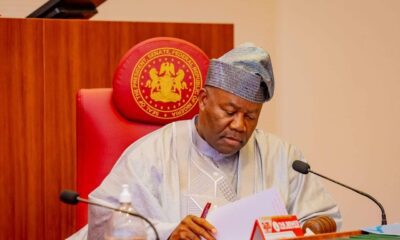Political Issues
Ministerial Appointments: Is It An Avenue To Eat Or To Perform? -By Isaac Asabor
Cost of Governance is any cost associated with the running of government. In other words, it is the cost incurred by the government in the course of providing goods and services to the citizenry. It may be subdivided into recurrent and capital expenditure. Whereas recurrent expenditure is government spending on overhead and personnel costs, capital expenditure on the other hand is government spending in providing infrastructural facilities.

There is no denying the fact that the developments that have characterized President Bola Ahmed Tinubu’s almost three months governance are too glaring to be ignored. It was initially his seeming autocratic removal of the fuel subsidy, which many saw as a speech gaffe, to the detriment of virtually all Nigerians, and now the nominations of 48 Ministers with the attendant shoddy screening by members of the Senate in the 10th National Assembly.
To say the somewhat shoddy selections of the nominees is incongruous will be an irony in this context. It is highly below par for a President who rode on the back of electoral promises that clearly indicated he will fight corruption, engender open governance and exhibit transformation of leadership to bow to pressure of primordial sentiments that are amusingly in the coloration of nepotism, tribalism and partisanship.
That the President has power to appoint ministers is not in doubt. However, there has been a long-held debate about the exigency of idealistically separating the executive from the legislature as they ought to maintain their respective independence. The foregoing democratic principle cannot be pooh-poohed as it minimizes the risks associated with having the same people making the law wielding power to execute them. However, such power should not be abused on the guise of rewarding party adherents and “Paddy-paddy” circle of friends. This is as the president has justified the ballooned cabinet as he recently told the President of the Nigeria Labour Congress (NLC), Comrade Joe Ajaero that over bloating the cabinet was aimed at boosting job creation. At this juncture, it will be compelling to ask, “Is Ministerial appointments meant for some few Nigerians to serve or merely to eat?
To begin with, those who sympathizes with the president may argue that he has appointed some of the most competent men and women to serve as Ministers. Unfortunately, this also could be looked at subjectively on a case by case basis even as his decision to over bloat his cabinet has been defended by none other than himself.
At this juncture, it is germane to ponder, “Could it be that the president was facing huge glitches and he needed a titanic team to fix them? The foregoing question can easily be pooh-poohed by not a few political observers who are of the view that the president’s decision to go by that mammoth number is largely viewed as yielding to pressure brought upon him by primordial sentiments, while ignoring the essence of competence in his nomination process, and the same reason goes at the screening stage where virtually all the nominees were literarily hailed with “Take a bow”.
At this juncture, it is expedient to ask, “Is Nigeria financially stable to compensate this huge number of ministers in terms of salaries (both for the ministers and their workers or aides)?
Posing the foregoing question in this context is germane as there are thickening concerns around the high cost of governance since the names of the 48 ministerial nominees were forwarded to the Senate for clearance by President Bola Tinubu, even as 560 commissioners-designates were at time were waiting for screening and confirmation in 27 states of the federation, where elections held in May this year. As gathered, this may cost the country about N23.4bn in salaries, according to findings by Saturday Punch of August 5, 2023.
As gathered, the figure was based on the recommended salaries and allowances for ministers and commissioners by the Revenue Mobilisation and Fiscal Allocation Commission (RMFAC).
The newspaper reported that “Aside from the annual basic salaries, the figure includes such as allowances for accommodation (200 per cent of basic salary), domestic staff (75 per cent of basic salary), utilities (30 per cent of basic salary), house maintenance (five per cent of basic salary), wardrobe (25 per cent of basic salary), furniture (300 per cent of basic salary), motor vehicle fueling allowance (75 per cent of basic salary), and entertainment allowance (45 per cent of basic salary), among others”.
At this juncture, it is expedient to ask if Mr. President is aware that the leadership of the RMAFC has been at the forefront of calls for reduction in the day to day government expenditure. In fact, the commission has not relented in its efforts of organizing Seminars and Workshops, even as it has continued to proffer useful suggestions and recommendations to governments at all levels on the need to scale down on unnecessary expenditure and to monitor expenses on developmental projects that would impact positively on the lives of the citizenry.
For the sake of clarity, Cost of Governance is any cost associated with the running of government. In other words, it is the cost incurred by the government in the course of providing goods and services to the citizenry. It may be subdivided into recurrent and capital expenditure. Whereas recurrent expenditure is government spending on overhead and personnel costs, capital expenditure on the other hand is government spending in providing infrastructural facilities.
In fact, it is expedient to ask, “Is good governance foreseeable and realizable only through huge and unwieldy cabinet? The answer to the foregoing question cannot be farfetched as other countries largely viewed as the super powers, including the United States, have even bought into the idea of choosing quality over quantity. The US, which is economically and financially more stable, as compared to Nigeria has by each passing political dispensation been mindful of the cost of governance, and hence takes cost-cutting steps in the number of political appointments in government.
At this juncture, it is germane to say that given the circumstances that inspired not a few Nigerians to yearn for a change of government having being groaning under the weight of rudderless tenures of former President Muhammadu Buhari, not a few Nigerians expected that Tinubu should be more concern about how economic stability can be restored under his watch, while pursuing policies that will provide a long-term foundation to sustain growth, create jobs, and protect the most vulnerable. To aptly put it, Nigerians expect the President to cut down on the numbers of his ministers and focus on quality than quantity.
Against the foregoing backdrop, it is expedient to ask, “Given the shoddiness that characterize the screening of the ministerial nominees, “Is the ministerial appointments an avenue to eat or to perform?



















